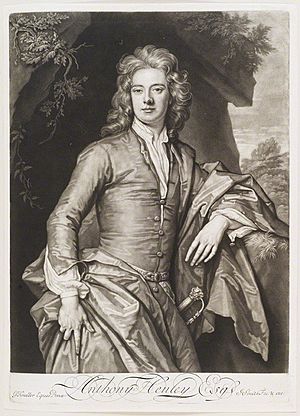Anthony Henley (1667–1711) facts for kids
Anthony Henley (born 1667 – died August 1711) was an English politician. He was a member of the Whig party, a political group in England. He served as a Member of Parliament (MP) in the English and later British Parliament from 1698 to 1711. He was well-known for his cleverness and wit.
Contents
Early Life and Family
Anthony Henley was born in 1667. His father was Sir Robert Henley, who lived at The Grange in Hampshire. Sir Robert was also a Member of Parliament. Anthony's mother was Barbara Hungerford.
When he was 15, in 1682, Anthony started studying at Oxford University. He focused on classic literature, especially poetry. In 1684, he began studying law at Middle Temple. His grandfather, also named Sir Robert Henley, was a legal official. From his grandfather, Anthony inherited a large fortune, which was more than £3,000 a year.
Political Career
When Anthony Henley moved to London, he quickly became friends with many clever and witty people. He was close to important figures like the Earl of Dorset and the Earl of Sunderland.
In 1695, he tried to become a Member of Parliament for Newtown (Isle of Wight) but did not win. This made him more interested in politics. By 1697, he was attending meetings of the Whig Rose Club and later the famous Kit-Cat Club.
In 1698, he was elected as an MP for Andover. In 1700, he married Mary Bertie, and this marriage brought him another £30,000. He did not run in the elections of 1701.
However, in 1702, he was elected again as a Whig MP for Weymouth and Melcombe Regis. He often helped count votes for the Whigs in Parliament. He was re-elected for Weymouth in 1705 and again in 1708.
In 1709, he supported a plan to allow people from a region called Palatine to become British citizens. In December 1709, he asked Queen Anne to give a special church position to Benjamin Hoadly. This was because Hoadly had supported the ideas of the Glorious Revolution. In 1710, Anthony Henley voted to put a religious leader, Dr. Sacheverell, on trial. He was elected for Weymouth one last time in 1710.
A Man of Wit and Support
Anthony Henley was known as one of the most clever Whig thinkers. He was friends with the famous writer Jonathan Swift after Swift published his book Tale of a Tub. Henley once made a funny comment about Swift, which Swift later wrote about in his Journal to Stella.
Henley also supported musicians. He helped the Purcell family, who were famous musicians. The songs for the opera Brutus of Alba were dedicated to Henley in 1696. He also helped with the music for another opera, The Grove, or Love's Paradise. Henley himself wrote several pieces of music and almost finished an opera called Alexander.
The poet Samuel Garth dedicated his poem The Dispensary to Anthony Henley. Henley was also a member of the Kit-Cat Club, a well-known club for important writers and politicians of the time.
Death and Family
Anthony Henley passed away in August 1711 from a sudden illness. He left behind three sons. His oldest son, Anthony, also became an MP and was known for being as witty as his father. His other sons were Robert Henley, 1st Earl of Northington, who became a very important judge, and Bertie, who became a churchman.
After Anthony's death, his wife Mary married her relative, Henry Bertie. Anthony also had half-brothers, John and Robert Henley, who were also MPs. His sisters married Sir Theodore Janssen and Sir John Rogers, 2nd Baronet. Anthony helped them get their marriage portions in 1698.
His Writings
Some people believe that Anthony Henley wrote for The Tatler, a popular journal. When the Whig journal Medley was started, Henley wrote one of its articles. He is also thought to have helped William Harrison continue The Tatler.
An interesting story Henley told about the death of King Charles II was included in Gilbert Burnet's History of his own Time. Alexander Pope, another famous writer, said that Henley wrote a chapter called "Life of His Music-Master, Tom D'Urfey" in the Memoirs of Scriblerus. Henley enjoyed writing about the habits of servants, and some parts of The Spectator might have been written by him.
See Also
 | Jackie Robinson |
 | Jack Johnson |
 | Althea Gibson |
 | Arthur Ashe |
 | Muhammad Ali |


